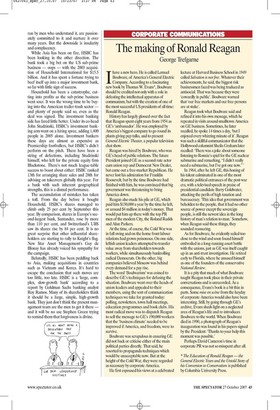The making of Ronald Reagan
George Trefgarne /have a new hero. He is called Lemuel Boulware, of America's General Electric Company. According to a fascinating new book by Thomas W. Evans*, Boulware should be credited not only with a role in defeating the intellectual apparatus of communism, but with the creation of one of the most successful US presidents of all time: Ronald Reagan.
History has largely glossed over the fact that Reagan spent eight years from 1954 as GE's 'ambassador'. He was employed by America's biggest company to go round its plants giving pep talks, and to present General Electric Theater, a popular television chat show.
Reagan was hired by Boulware, who was GE's head of public relations. The future President joined GE as a second-rate actor cum union rep and Democrat New Dealer, but came out a free-market Republican. He never lost his admiration for Franklin Roosevelt, but by the time Boulware had finished with him, he was convinced that big government was threatening to bring America down.
Reagan also made his pile at GE, which paid him $150,000 a year by the time he left, or around $4 million in today's money. That would put him up there with the top PR men of the modern City, the Roland Rudds and Alan Parkers.
At the time, of course, the Cold War was in full swing and on the home front labour relations had grown poisonous. On one side, leftish union leaders attempted to transfer value away from shareholders towards workers, while simultaneously bankrolling radical Democrats. On the other, big companies believed Moscow was behind every demand for a pay rise.
The word `Boulwarism' was coined to describe GE's techniques for defusing the situation. Boulware went over the heads of union leaders and appealed to their members, using the sort of communication techniques we take for granted today: polling, newsletters, town hall meetings, education programmes and book clubs. His most radical move was to dispatch Reagan to sell the message to GE's 190,000 workers that the 'business climate' needed to be improved if America, and freedom, were to survive.
Boulware was scrupulous in ensuring GE did not back or criticise either of the main political parties directly. That said, he resorted to propaganda techniques which would be unacceptable now. But at the height of the Cold War, they were regarded as necessary by corporate America.
He first espoused his views at a celebrated lecture at Harvard Business School in 1949 called Salvation is not free. Whatever their achievements, he said, the biggest risk businessmen faced was being traduced as antisocial. That was because they were 'cowardly in public'. Boulware warned that 'our free markets and our free persons are at stake'.
Reagan took what Boulware said and refined it into his own message, which he repeated in visits around smalltown America on GE business. Sometimes, he later recalled, he spoke 14 times a day, tut I enjoyed every whizzing minute of it'. Reagan was such a skillful communicator that the Hollywood columnist Sheila Graham later recalled: 'There was a joke about someone listening to Ronnie's spiel for the GE nuclear submarine and remarking, "I didn't really need a submarine, but I've got one now."
In 1964, after he left GE, this honing of his talent culminated in one of the most dramatic political entrances of the post-war era, with a televised speech in praise of presidential candidate Barry Goldwater, attacking the perils of high taxation and bureaucracy. 'This idea that government was beholden to the people, that it had no other source of power except the sovereign people, is still the newest idea in the long history of man's relation to man.' Somehow, when Reagan said these things, they sounded reassuring.
As for Boulware, he evidently sailed too close to the wind and soon found himself embroiled in a long-running court battle with the unions, just as GE was itself caught up in an anti-trust investigation. He retired early to Florida, where he amused himself as one of the founders of the conservative National Review.
It is a pity that much of what Boulware taught Reagan took place in their private conversations and is unrecorded. As a consequence, Evans's book is a bit thin in parts. Some mise en scene from the heyday of corporate America would also have been interesting. Still, by going through GE's archive, Evans sheds light on a neglected area of Reagan's life and re-introduces Boulware to the world. When Boulware died in 1990, a photograph of Reagan's inauguration was found in his papers signed by the President. 'Thanks to your help this moment was possible.'
Perhaps David Cameron's time in corporate PR was not so misspent after all.
* The Education of Ronald Reagan — the General Electric Years and the Untold Story of his Conversion to Conservatism is published by Columbia University Press.


































































 Previous page
Previous page